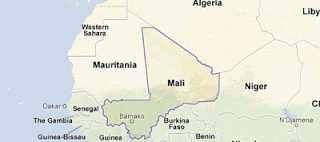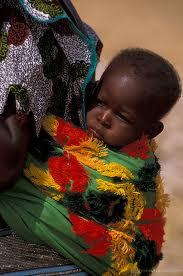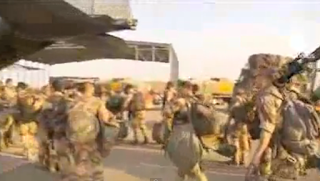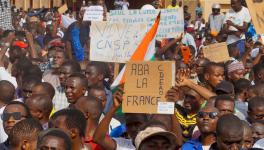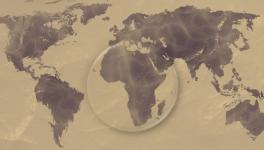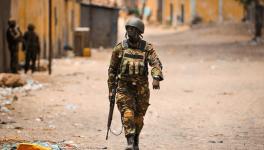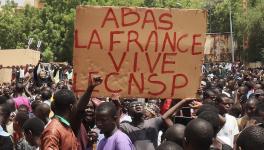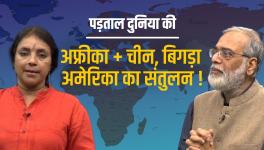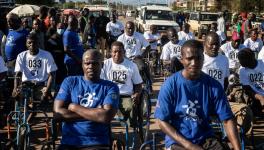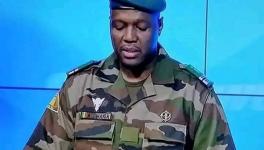Habits of French colonialism.
“In other days France was the name of a country. We should take care that in 1961 it does not become the name of a nervous disease.”
-- Jean Paul Sartre, preface to Frantz Fanon’s Wretched of the Earth.
In an early French film on the colonies, Enfants annamites ramassant des sépèques devant la Pagode des dames (Lumière Brothers, 1897), two French women smile condescendingly as they scatter coins to a group of Vietnamese children, who scramble to gather them. Little has changed in the French attitude to its former colonies in more than a century. The “Socialist” president François Hollande’s deceitful claim that France is in Mali to protect the country from Islamism is shallow: there are other motivations that linger so close to the surface, such as France’s desire to project itself into an increasingly restive Francophone Africa since its 2011 intervention into Cote d’Ivoire as well as France’s need for nearby Niger’s uranium for its nuclear energy and for Mali’s gold. Like the two women in 1897, Hollande stands at the Élysée Palace, dripping with hypocrisy.
The French “socialists” have always been keen colonizers, and strikingly, they have found willing collaborators in the wider French Left. In 1956, at the height of the Algerian struggle for national self-determination, the French communist delegates voted in favour of the Socialist Prime Minister Guy Mollet’s government to grant “special powers” to its colonial security services in Algeria. Mollet was committed to anti-colonialism before he became the head of the government, with his volte-face treated to tomatoes during a visit to Algiers (la journée des tomates, it is called). French philosopher Jean Paul Sartre wrote a stinging attack on the Left’s position on Algeria in 1957. “They talk of Algeria,” he wrote, “but in moderate terms.” No protests against the war, no days of action. “Its activists are grumbling,” he wrote, and “as for the working-class, the result, and perhaps the aim, of this policy is that it is entirely demobilized…..The [Left] is reaping what it has sown: when it needs the masses, it will no longer find them.”
Sartre was right. Eighteen months later, when the Fourth Republic collapsed, the Left could not seize the situation. It lost a million and a half votes in the elections, ushering Charles de Gaulle back to power and inaugurating the Fifth Republic.
The French Left has learned no lessons.
On January 16, Deputy François Asensi of the Gauche démocrate et républicaine parliamentary bloc (and former Communist member) gave a speech at the National Assembly. Non-intervention would have been cowardice, he notes (La non-intervention aurait été la pire des lâchetés). The position of the Left Front, the Communists and the Republicans, he continued, is clear: “to abandon the people of Mali to the barbarism of fanatics would be a political error and a moral failing” (La position des députés du Front de gauche, communistes et républicains, est claire: abandonner le peuple malien à la barbarie des fanatiques aurait été une erreur politique et une faute morale). The jihadists of Northern Mali had to be stopped, said Deputy Asensi, or else they would create a despotic, blood thirsty and medieval state (des régimes despotiques, sanguinaires et moyenâgeux). Echoing George W. Bush and his amanuensis on the war on Iraq Christopher Hitchens, Deputy Asensi notes, that fundamentalism is a new form of fascism (Leur fondamentalisme constitue une forme nouvelle du fascism). There is no mention here of the Tuareg fight for self-determination that goes back to the 1960s which had been suppressed by the French themselves, nor anything about the French-led Libyan war of 2011 that sent radical Islamist fighters across the border into Azwad (northern Mali) to tip the balance against the Tuareg nationalists. What we get from Deputy Asensi is the bland defence of French neo-colonialism couched in the language of humanitarian internationalism, “International military action was necessary to avoid the installation of a terrorist state” (Une action militaire internationale était nécessaire pour éviter l’installation d’un Etat Terroriste).
The Communists partly differentiated themselves from their erstwhile member. Four days before, their statement echoed the French worry about the jihadist groups moving to the South. There was no mention of the resource wars. A small mention of the French neo-colonial agenda (Françafrique) was brushed aside by saying that this intervention “can be seen” in colonial terms (and not is a colonial assault). But then, as with Deputy Asensi, it tried to shift the burden of the military operation from France to Bamako and to the United Nations (Le PCF rappelle que la réponse à la demande d'aide du Président du Mali aurait du s'inscrire dans le cadre d'une mission de l'ONU et de l'Union africaine, réalisée sous drapeau de l'ONU, par des forces maliennes et africaines, dans le strict respect de la Charte des Nations-Unies, dans les limites imposées par l'exigence de la souveraineté malienne).
It is the case that the Malian “government” did request assistance. But bear in mind that this “government” came to power as a result of a coup led by the military, whose coup leadership (especially Captain Amadou Sanogo) was trained by the US; and that the actual Malian democracy of the 1990s was consistently undermined by the West and the IMF, who inserted their own man to the prime minister’s office in the early 2000s. Mali did not call for the intervention; the undemocratic, and Western backed, coup regime’s antecedents did. The current President, Dioncounda Traoré is only the Acting President, whose installation to his current office in April 2012 was sealed with a promise to fight a “total and relentless war” on the Tuareg, giving in, therefore, to the Malian military’s main grouse that led to the March 2012 coup in the first place. Traoré’s first Acting Prime Minister, Cheick Modibo Diarra was removed by the coup leaders in mid-December 2012 and replaced by Django Sissoko, who presided over a regime dominated by the coup leaders. This is the government that invited the French into Mali. Sanogo’s own political leanings can be gauged by the fact that he opposed the entry of an UN-authorized African force (staffed by ECOWAS) but he welcomed the French bombardment.
The African Union’s head, Yayi Boni, but not the African Union itself, hastily blessed the French intervention. Benin’s President Boni, a former banker who has become paranoid about his own safety, said he was aux anges or thrilled with the French intervention. Niger’s Mahamadou Issoufou backed the intervention and a military solution, but more it seems out of nervousness about Niger’s precarious position. When Issoufou came to power in 2011, he appointed a Tuareg social democrat, Brigi Rafini to be his Prime Minister, seeking to unite all of Niger, including the restive Tuareg. Pressure on the Francophone African heads has been immense – but even here there are signs of stress, as it is disagreement amongst them that has prevented a clear line from the African Union in Addis Ababa.
The UN support for the intervention is, despite Deputy Asensi’s claims, also shaky. UN Security Council resolution 2085, negotiated in December, was to provide safeguards against an extension of any intervention. It is not clear that the French provided any safeguards to the UN before its January 11 bombardment of Konna. Paragraph 11 of the UN Resolution is fairly clear,
“Emphasizes that the military planning will need to be further refined before the commencement of the offensive operation and requests that the Secretary-General, in close coordination with Mali, ECOWAS, the African Union, the neighbouring countries of Mali, other countries in the region and all other interested bilateral partners and international organizations, continue to support the planning and the preparations for the deployment of AFISMA [African Led Support Mission to Mali], regularly inform the Council of the progress of the process, and requests that the Secretary-General also confirm in advance the Council's satisfaction with the planned military offensive operation.”
The UN has been caught a bit wrong-footed, once more opening the door to an intervention with safeguards in place, but then watching one of its permanent members disregard the caution and its provisions as it bombs and kills civilians in the name of the UN. For the French Left to hide behind the UN, when it is exactly what the French military assault is doing, is to ridicule both the UN Charter and the entire tradition of anti-colonialism and human rights. France’s UN Ambassador Gerard Araud will brief the UN Security Council on Tuesday, January 22. It is expected that he will reinforce the tired narrative: jihadis have to be stopped, France is only assisting the Malian government, and so on.
The French operation is called Serval, the African wild cat, whose figure is the symbol of the Italian island of Lampedusa – the gateway between Europe and Africa. During the Libyan war, Lampedusa became the contentious stopping point for Africans fleeing the crisis for Italy. Now, the herald of Lampedusa, the serval, blesses the jet fighters as they go in the other direction, bombing Africa as if by habit, throwing dust in the eyes of the world’s peoples.
Disclaimer: The views expressed here are the author's personal views, and do not necessarily represent the views of Newsclick
Get the latest reports & analysis with people's perspective on Protests, movements & deep analytical videos, discussions of the current affairs in your Telegram app. Subscribe to NewsClick's Telegram channel & get Real-Time updates on stories, as they get published on our website.









